Top Australian trail runner, Vlad Ixel, is currently in town – to interact and share tips with the local running community. He is also here with his partner and fellow top runner, Eti Rodriguez – to organise The Great Relay Singapore, an ultra trail relay race, which takes place on June 13 this year.
Ixel, who started running in 2012, has definitely come a long way in this sport. Today, he has a number of podium finishes and race wins to his name. Some of these include winning the recent TransLantau 100km race in Hong Kong last month, as well as The North Face 100km Singapore in 2014 and The Most Beautiful Thing (TMNT) 100km in Malaysia in 2013.
Earlier this week, Ixel gave a talk to runners at the IRAS Building in Novena, where he spoke on several topics including diet, training and post-race recovery – drawing examples from himself as a runner.
Here are some of the main highlights from Ixel’s talk.
Diet and Race Nutrition
As a runner, the types of food that you consume is very important, according to Ixel. He strongly believes in the “eat to run” philosophy.
During his younger days, before he took up running, Ixel used to be a bodybuilder. He explained, “So i was buying massive tubs of proteins and eating meat three times a day. I used to eat one kilogram of steak at one go.”
But soon after picking up running, Ixel decided to switch to an all-vegetarian diet. Explained Ixel, “At the beginning, I gave myself two weeks with no meat, cheese and eggs and I found that I started recovering quicker after my runs. I then realised that I didn’t need so much proteins for my body to function.”
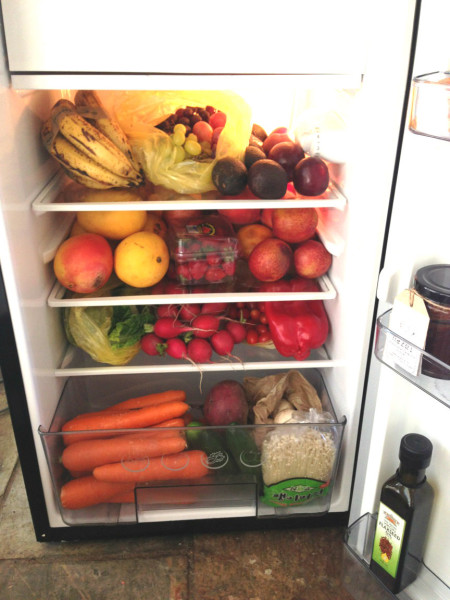
The main contents of Vlad Ixel’s fridge today… are plenty of fruits and vegetables.
Photo: Vlad Ixel
Stays away from refined and processed foods
Today, there is only one rule to Ixel’s vegetarian diet – staying away from processed foods, that is, basically anything that has gone through an elaborate refining process in a factory. These tend to be “addictive” foods such as canned items, refined grains, white sugar and so on.
Said Ixel, “I realised that I didn’t want to get addicted to any foods. If you look at caffeine, white sugar and alcohol, it is very easy to become hooked onto these. But I wanted to control them, not to let them control me. So I would take a week without caffeine and a week with it. For example, a lot of people are addicted to coffee and need it to function normally. But I realised that I am stronger than that.”
Does not believe in consuming refined carbs
So as a result, Ixel’s diet today comprises mainly of fruit and vegetables. When it comes to carbo loading, he does not believe in consuming pastas and white rice. Instead, he eats plenty of bananas, because they have lots of natural, healthy sugars inside them.
So in that regard, Ixel considers the practice of carbo loading as being quite excessive – and eating for example, three plates of pasta the night before a race will often not turn out well – even though the marathon manual might have told you that this is the way to go! In fact, the human body should be able to cope with running or walking for eight hours continuously – without you having to give it any fuel, according to Ixel. So you do not actually need to consume that much food to fuel your running.
This also applies to fuelling your body with energy gels during long runs. Said Ixel, “I think that runners are too dependent on gels. For me, I do a long run once a week or fortnight without any food, water or gels before and during a run. Sometimes I may take a spoonful of peanut butter to give myself some fats, but that is about it,” said Ixel.
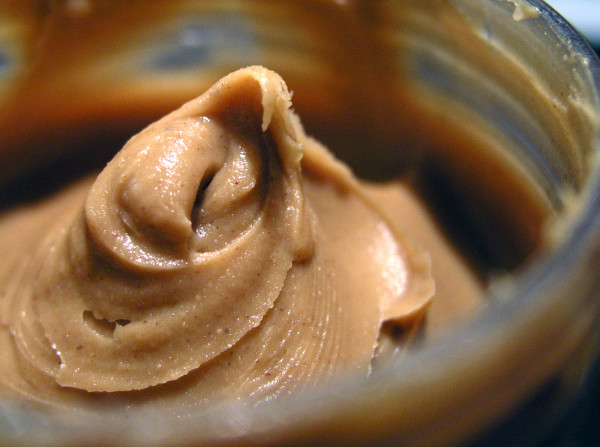
Sometimes Vlad may have a spoonful of peanut butter before a run, but nothing else.
Photo: Wikipedia.
Burn fats instead of carbohydrates
Ixel also added that if you are able to train your body to burn fats instead of carbohydrates, it will be much more beneficial in terms of your running – as you will not need to fuel yourself so regularly during your runs. The problem with most people though, is that the body tends to burn carbohydrates by default instead of fats. That is why people’s energy stores tend to get depleted so fast. If you are running at 75 to 80 per cent of your maximum heart rate, you are most likely burning carbohydrates. But by running at 55 to 60 per cent of your maximum heart rate, fat cells are typically burned for fuel instead. (Far fewer calories in total are generally likely to be burned though with these slower-paced workouts).
According to the runner, burning fats though, isn’t simply about consuming fats and expecting the body to use the energy from the fats – you will have to teach the body to specifically utilise the fats first and that takes time and plenty of practice. One basic way to improve your body’s fat-burning capacity is through doing consistent exercise – to make your body become more efficient at extracting oxygen from the cells and improving the circulation of fatty acids through your bloodstream. Also you could incorporate various types of exercise of differing intensities – to stimulate all of your body’s different energy systems.
A typical day in Ixel’s diet
In the mornings, Ixel drinks half a litre of water to kick-start his digestive system. Then he will take a fruit smoothie for breakfast, because that contains plenty of healthy sugars to give him energy throughout the day. For lunch, he has a raw salad. At dinner time though, he will consume cooked food such as beans and quinoa – because he will need the energy especially if he is going out for a pre-breakfast long run the following morning.
On race days though, Ixel adds that he will consume the same food that he had for dinner – for his race morning breakfast. And if the race flags off at 5am in the morning, he will wake up at 2am to eat. Then subsequently he will drink lots of water in the two hours following that, and will stop drinking completely about one hour before the flag off time.
Important to refuel after a training session
After every training session or running event, Ixel emphasised that it is very important to refuel yourself, to replenish the water and salts that the body has lost through the exercise. For Ixel himself, he will take magnesium tablets, Vitamin C pills and electrolyte tablets after each workout, to rehydrate his muscles
Training and Running
To train for a race, it is not simply all about running. In fact, Ixel cites an example that if you set aside 10 hours of training per week, three hours of this should be dedicated to pure running. The rest of the sessions should comprise of core, strength and balance work.
This is because as a trail runner, you need to have big and strong legs. This is not about going to the gym and lifting heavy weights though, as you would not want to carry the weight around when running long distances on the trails. Instead, you should do purely body strength exercises such as squats and planking.
Upper body exercises are also important, but without using weights. This is because when your legs are feeling tired after running for long distances, it often helps to swing your arms – as this helps to put some strength back into your running form and you will be able to continue running, despite the fatigue.
Post-recovery sessions the next day are important
At the same time, post-race recovery sessions are very important. Said Ixel, “After my first 100km race, I forced myself to wake up the next day for a short jog. This is because I needed the blood flowing through my muscles to get moving. I am not going to sit around for one week after a race to recover. Active recovery is the best for me.”
So if you are feeling sore the next day after a race, it is all the more important that you should go out there and get active – as it will help you to recover much faster.
Do as many races as possible
At the same time, Ixel also believes strongly in doing as many races and as many varieties as possible, to get stronger – and at the same time, to find out what are his main strengths in terms of running. This is because the more types of races you are exposed to, you will start to find out what you like the most.
He explained, “I don’t know my strengths at the moment, so I am trying to race as much as possible. Do not be scared to go outside your comfort zone. Sign up for races that you may not feel comfortable with. I am racing as much as I want, really. But maybe in a couple of years I will choose races with the aim of performing better in them. I currently love 100km trail races and that is my comfort zone, but I have also done marathons and 10km road races – and it has crossed my mind that if I can cut two minutes off my 10km timing, I can make the Australian Olympic team. But that is for the future.”
Mix it up
Ixel also adds that during training, it is important to mix things up. Do not do exactly the same workout every time. This is because the human body is very good at getting used to something and it will no longer improve, once it is accustomed to a specific type of workout.
“So mix things up and keep your body guessing. If you are used to something, stop doing it and go for a change in your workout. Get outside your comfort zone. For example, some people may not like to do hill repeats because it is too tough. But that is not the way to go,” the runner explained.
Active Recovery
To Ixel, it is very important for ultra trail runners to do yoga and stretching activities to help their muscles recover. Just because ultra running is a slow sport, many runners believe that they do not need to stretch their muscles – but he stressed that this is not true at all. You should do at least five minutes of warm-up and another five minutes of cool-down exercises to prepare for both training sessions as well as races.
As well, doing massaging is important to help the muscles relax. But you do not need to go for those fancy and expensive massage services. Ixel himself does self massages.
Minimalist or Barefoot Running
Ixel generally does not believe in wearing padded running shoes. Instead, he believes that runners should go back to basics and consider minimalist or barefoot running. In his case, taking up barefoot running has really helped greatly with injury prevention.
However, the runner cautions that when experimenting with barefoot running for the first time, you should start slowly. Don’t simply jump straight into it and start doing a 10km run barefoot when you have never done it before. Instead, just go barefoot for 50 or 100 metres to begin with and slowly increase the barefoot distance when your body gets more used to this feeling and sensation. He also added that you should listen to your body’s natural stride – there is no difference between heel or forefoot running. If you try to change your stride, it will only increase your chances of injury as well.
At the same time, you should also do a lot of balancing work because after so many years of wearing thick running shoes, Ixel believes that your shoes would have made your feet weak and the muscles would not be working to their full capacity. So you should do exercises such as simply standing on one foot or doing one-legged squats.
Success comes with sacrifice
To sum up his talk, Ixel added that he has sacrificed a lot, in terms of relationships with his friends and family, to get to where he is today in terms of his running. And if you want to succeed and get far in life, this is what you too, should do.
More sessions with Ixel and Rodriguez
Ixel and Rodriguez will be conducting running clinics for The Great Relay Singapore, until 7 April.
The remaining clinics will be held at the following dates and times.
- Saturday 4th of April @ 7:30am from MacRitchie Reservoir
- Sunday 5th of April @ 7:30am from MacRitchie Reservoir
- Monday 6th of April @ 8:00am from MacRitchie Reservoir
- Tuesday 7th of April @ 8:00am from MacRitchie Reservoir.
Clinics are $45 per person and registrations are currently open on racematix (https://www.racematix.com/site/#entry:rac/73:0:A).
To find out more about, or sign up for The Great Relay Singapore, go to http://www.tgrsg.com.

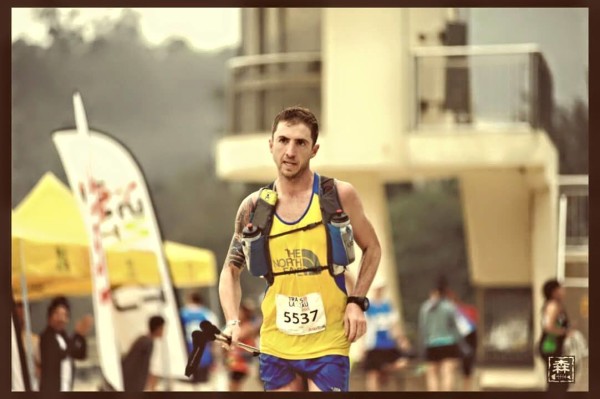
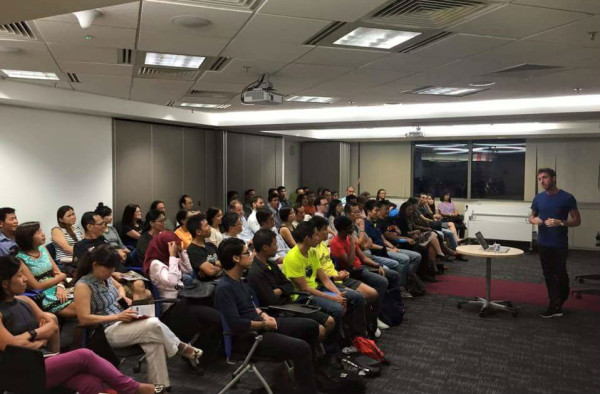
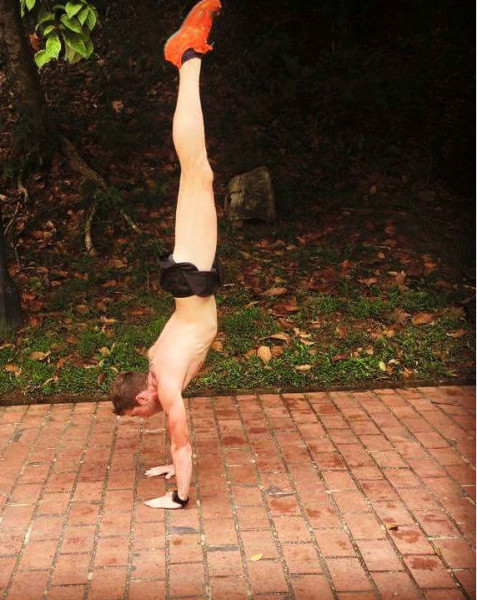
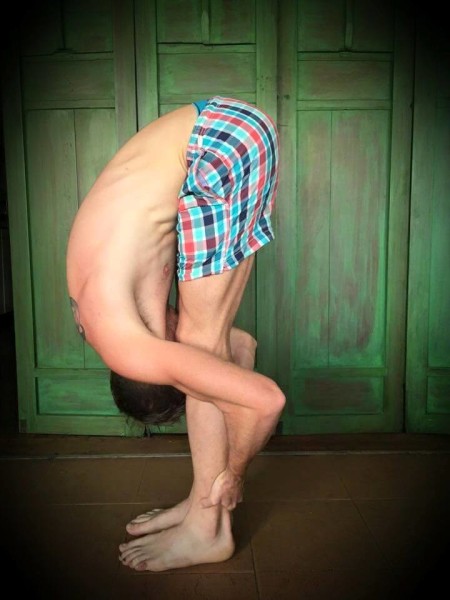
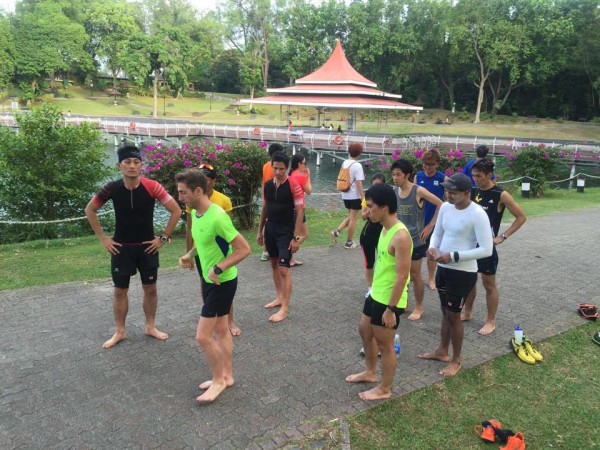
Leave a Comment